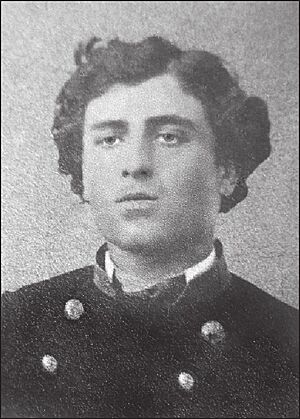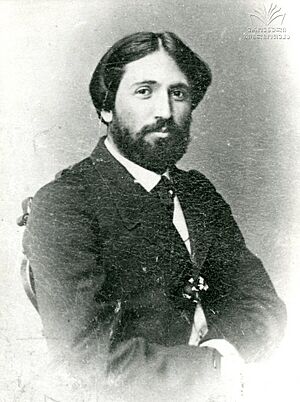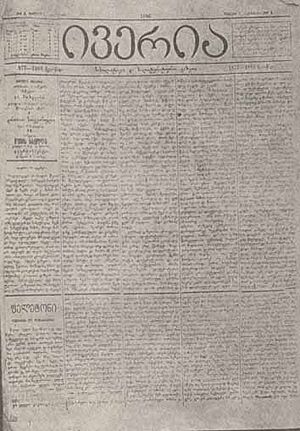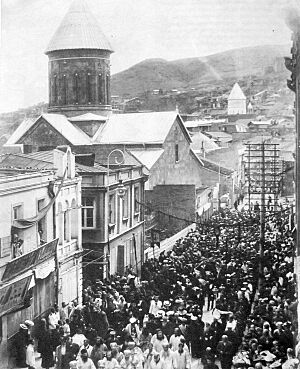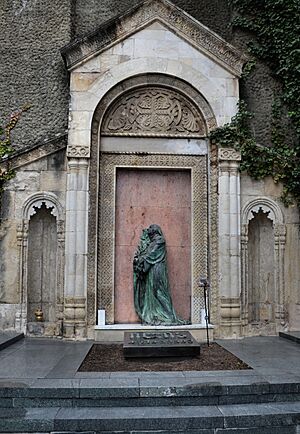Ilia Chavchavadze facts for kids
Quick facts for kids
Tavadi
Ilia Chavchavadze
|
|
|---|---|
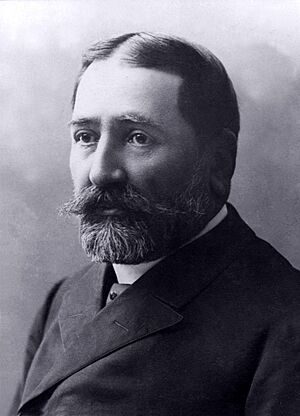 |
|
| Native name |
ილია ჭავჭავაძე
|
| Born | 8 November 1837 Kvareli, Georgia Governorate, Russian Empire (present-day Kakheti, Georgia) |
| Died | 12 September 1907 (aged 69) Tsitsamuri, Tiflis Governorate, Russian Empire |
| Resting place | Mtatsminda Pantheon, Tbilisi |
| Occupation | jurist, poet, novelist, humanist, publisher, philosopher |
| Nationality | Georgian |
| Literary movement | |
| Signature | |
 |
|
Prince Ilia Chavchavadze (Georgian: ილია ჭავჭავაძე; born November 8, 1837 – died September 12, 1907) was a very important Georgian public figure. He was a journalist, publisher, writer, and poet. He led the movement to bring back Georgian nationalism in the late 1800s.
Ilia Chavchavadze made sure the Georgian language, literature, and culture survived. This was during the last years of Russian rule in Georgia. Many people call him Georgia's "Father of the Nation." He is still a widely admired hero today.
He was a leader of a youth group called "Tergdaleulebi." This group spread modern European ideas of freedom in Georgia. Ilia Chavchavadze started two newspapers: Sakartvelos Moambe and Iveria.
He also helped create Georgia's first financial group, the Land Bank of Tbilisi. Its goal was to protect Georgian land from being bought by others. He was the chairman of this bank for 30 years. Through the bank, he helped fund many cultural, educational, and charity events in Georgia.
Ilia Chavchavadze also helped start the "Society for the Spreading of Literacy among Georgians." This group opened schools that taught in the Georgian language. This was very important in stopping the Russification policy of the Russian Empire in Georgia. Russification was an effort to make everyone speak Russian and adopt Russian culture.
Inspired by new ideas across Europe, Chavchavadze worked hard to awaken national pride among Georgians. He wrote many articles in his newspaper Iveria and other publications. In his articles, he wrote about literature, education, theater, politics, and current events.
His ideas on self-government, justice, social issues, and human rights were very advanced for his time. He strongly protected the Georgian language and culture from Russian influence. He created the famous phrase "Ena, Mamuli, Sartsmunoeba," which means "Language, Homeland, Faith." This became a key slogan for Georgian nationalism.
During the 1905 Russian Revolution, Chavchavadze was chosen to represent the Georgian nobles in the Russian State Council. However, he said he would represent the entire nation, not just one group. He spoke against capital punishment (the death penalty) and pushed for Georgia to have more control over itself.
His most important literary works include The Hermit, The Ghost, Otaraant Widow, and Letters of a Traveler.
Chavchavadze was killed in Tsitsamuri, near Mtskheta, by a group of attackers. The details of his murder are still debated today. His great work earned him the deep respect of the Georgian people. In 1987, the Georgian Orthodox Church made him a saint, calling him Saint Ilia the Righteous. Today, Georgians honor Chavchavadze as The Uncrowned King and the "Father of the Nation."
Contents
A Look at His Life
His Family and Early Years
Ilia Chavchavadze was born in Qvareli, a village in the Kakheti region of Georgia. At that time, Georgia was part of the Russian Empire. Ilia was a tavadi, which is a Georgian title for a prince. The noble Chavchavadze family is thought to have come from the Pshav-Khevsureti region of Georgia.
In 1726, King Constantine II gave the Chavchavadze family the rank of Prince. This was to honor their bravery and service to the nation. Because of this, the family moved and settled in the Alazani Gorge in Kakheti.
Ilia was the third son of Grigol Chavchavadze and Mariam Beburishvili. His father, Grigol, came from a military background, just like his ancestors. He and local soldiers protected the village from many invasions. You can see this in the design of the Ilia Chavchavadze museum house in Kvareli. It has a Medieval castle style, with a two-story castle in the yard built for protection.
Ilia first learned to read and write from the village deacon. Then, in 1848, he moved to Tbilisi to attend a respected school for nobles. From a young age, Ilia was influenced by his parents. They were very educated in classical literature, Georgian history, and poetry.
From his parents, Ilia learned inspiring stories of Georgian heroes from old historical novels. In his autobiography, Ilia mentioned his mother, Princess Mariam Chavchavadze. She knew most Georgian novels and poems by heart and encouraged her children to study them. Ilia also said the deacon's storytelling gave him artistic ideas for his own novels.
Ilia's mother, Mariam, died on May 4, 1848, when Ilia was ten years old. His father asked his sister, Makrine, to help raise the children. "Aunt Makrine" had a big impact on Ilia's life. After his father, Grigol, died in 1852, she was the only one left to care for the family.
In 1848, after his mother's death, Ilia was sent to Tbilisi for his high school education. He attended a private school for three years. Then, in 1851, he entered the 1st Academy of Tbilisi. Soon after, Ilia's father died, and Aunt Makrine took care of the family.
His high school years were difficult because of his father's death. The Chavchavadze family faced another sad event when Ilia's brother, Constantine, was killed. This happened during a raid on Kakheti. Ilia wrote about his pain in one of his first poems, Sorrow of a Poor Man. The political situation in Georgia also got worse under the strict rule of the Russian Empire. This was harmful to the nation and its culture.
His Student Years
After finishing the academy, Ilia decided to continue his education at the University of St. Petersburg, Russia. Before leaving for St. Petersburg, Ilia wrote a famous poem, To the Mountains of Kvareli. He wrote it on April 15, 1857, in the village of Kardanakhi. In this poem, he showed his deep love for the Greater Caucasus Mountains and his sadness about leaving his homeland.
That same year, Ilia was accepted into the University of St. Petersburg. During his time as a student, many revolutions happened in Europe. Ilia watched these events with great interest. He was especially interested in the events in Italy and the fight led by Giuseppe Garibaldi. He admired Garibaldi for many years.
The cold climate in St. Petersburg made Ilia very sick. He returned to Georgia for several months in 1859 to recover.
Ilia finally returned to Georgia after finishing his studies in 1861. During his trip back, Ilia wrote one of his greatest works, The Traveler's Diaries. In this book, he talked about the importance of building a strong nation. He used the example of Mt. Kazbegi and the Tergi River in Georgia to make his point.
His Political Work
Ilia's main political goals were based on Georgian nationalism. He encouraged Georgians to resist the Russian government's policy of forced Russification. He wanted to bring back the Georgian language and develop Georgian literature. Even more daring, he pushed for the Georgian Orthodox Church to be independent from Russian control.
In the 1860s, a new group of Georgian thinkers called "Tergdaleulebi" emerged. They were educated in Russian universities and learned about European ideas. They promoted Georgian culture against being absorbed by the Russian Empire. Ilia Chavchavadze led this group. Their ideas became more nationalistic as Georgian nobles lost power and capitalism grew. This was also fueled by Russian officials and the economic power of Armenian merchants in Tbilisi.
Chavchavadze famously founded "The Bank of the Nobility" in Tbilisi. Its goal was to protect Georgian land from being sold by poor Georgian nobles. He also created the slogan "Language, Homeland, Religion." This became the motto of Georgian nationalism. Chavchavadze and his friends called for all Georgians to unite. They put national interests above differences in social class or region.
They did not plan a full revolt for independence. Instead, they asked for Georgia to have more self-rule within the Russian Empire. They wanted more cultural freedom, support for the Georgian language, and help for Georgian schools. They also wanted the national church to regain its independence, which the Russian government had taken away.
As more people supported Chavchavadze's ideas, he faced opposition. This came from different political groups, especially those who wanted a unified Russian Empire. These groups did not support the revival of the Georgian Church, State, or a distinct Georgian identity. They saw Ilia as an old noble who did not understand the importance of a new, revolutionary future.
Besides his other work, Chavchavadze also founded and led many public and educational groups. These included the "Society for the Spreading of Literacy Among Georgians." He also translated British literature. His main literary works were translated into many languages, including French, English, German, and Russian. From 1906 to 1907, he was a member of the State Council (Duma) in Russia. He was also a member of other important groups, like the Caucasian Committee of the Geographical Society of Russia.
Prince Chavchavadze briefly helped a young Joseph Stalin, who was then a student in Tbilisi. Historian Simon Sebag Montefiore noted that Chavchavadze was impressed by Stalin's writing. He even chose five of Stalin's poems to publish, which was a big achievement. Prince Chavchavadze called Stalin the "young man with the burning eyes."
His Death
After serving in the Russian Duma, Ilia decided to return to Georgia in 1907. On August 28, 1907, while traveling with his wife Olga, Prince Ilia Chavchavadze was attacked. A group of six assassins murdered him in the small village of Tsitsamuri, near Mtskheta.
The Prince's murder was seen as a national tragedy. All Georgians mourned his death. Prince Akaki Tsereteli, who was very ill at the time, spoke at the funeral. He gave a moving speech, saying: "Ilia's priceless contribution to the revival of the Georgian nation is an example for future generations." The famous Georgian poet Vazha-Pshavela said: "Ilia's murderers would have killed Georgia if they could."
After Ilia's death, news about his assassination was mostly found in one small newspaper called Isari. This paper gave detailed coverage of the event. Surprisingly, larger newspapers did not report much on the details of Ilia's murder.
The Investigation
In 1907, the Russian authorities started an investigation into Chavchavadze's death. They arrested four suspects. One suspect, Gigla Berbichashvili, who led the group, hid in Iran. Another suspect died in clashes with the police. According to the investigation, during the attack, Chavchavadze said: "Do not shoot, I am Ilia." Gigla reportedly replied: "That's why we have to shoot you."
In 1909, a court sentenced the entire gang to death. After the October Revolution, Gigla Berbichashvili returned to Georgia in 1921. He worked in various roles for the Soviet Georgian government. In 1936, an investigation was launched against him for his part in Ilia Chavchavadze's murder. In December 1941, he was tried and sentenced to death in January 1942. However, this was later changed to 10 years in prison.
Different Ideas About His Death
The assassination of Ilia Chavchavadze is still debated today. The Russian investigation said the murderers were part of a political group. The later Soviet investigation blamed the Russian secret police. Unofficial ideas often blame other political groups for planning the murder.
Chavchavadze had publicly and successfully weakened the growth of these political groups. Also, Prince Chavchavadze's Christian and traditional view for Georgian nationalism and his huge popularity may have been other reasons. Historian Simon Sebag Montefiore suggests that Joseph Stalin might have been involved in the murder of his former publisher.
Montefiore notes that the political groups had attacked Chavchavadze's traditional view of Georgian culture. It was widely believed they decided to kill him. There is some evidence that Stalin's friends organized or took part in the assassination. Stalin always praised Chavchavadze's poetry later in his life. There is no direct proof he ordered the killing. However, he was very close to those involved and was known to put politics first.
His Legacy
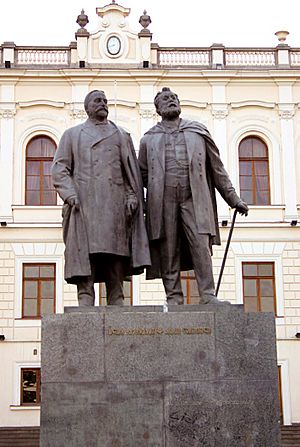
Ilia Chavchavadze is seen as "the founding father of the modern Georgian nation." His work to awaken national pride earned him the lasting admiration of the Georgian people. He is known as the Uncrowned King of the Nation. His work was recognized during his lifetime and even during the Soviet period. His legacy is still highly valued in modern Georgia. In 1937, the Soviet authorities celebrated the hundredth anniversary of Ilia Chavchavadze's birth. During Soviet times, his strong criticism of serfdom (a system where peasants were tied to the land) was especially highlighted.
After the Soviet invasion of Georgia in 1921, Chavchavadze became a symbol of Georgian freedom and national liberation. In 1987, the Georgian Orthodox and Apostolic Church officially made him a saint, calling him "Saint Ilia the Righteous." In October 1987, the Ilia Chavchavadze Society was formed. This group promoted Georgian national revival and political independence. In 1989, during the anti-Soviet protests in Tbilisi, Prince Ilia Chavchavadze's poems, novels, and political beliefs became a driving force for Georgia's fight for independence.
In 1998, Stephen Kinzer wrote about how much Chavchavadze was admired by people from all political views. He said: "Today leftists in Georgia embrace Chavchavadze for his hatred of injustice. Centrists love him for his peaceful humanism. And right-wing nationalists have adopted his slogan Motherland, Language, Faith." In this context, "Faith" specifically means Georgian Orthodoxy.
In 2006, Ilia State University was named after Ilia Chavchavadze. Many streets and avenues are also named after him, including Tbilisi's main avenue, Ilia Chavchavadze Avenue. Chavchavadze's most important works, like Is a man a human?!, are taught in Georgian schools in "Georgian Language and Literature" classes.
Published works
- Georgian Poetry: Rustaveli to Galaktion: A Bilingual Anthology. Translations by Lyn Coffin, with the help of Gia Jokhadze. Slavica, Bloomington, Indiana, 2013.
- Georgische Dichter. Translated and put together by Arthur Leist, Dresden-Leipzig, 1887 (Poems of Ilia Chavchavadze and other Georgian poets, in German).
- The Hermit by Prince Ilia Chavchavadze. Translated from Georgian by Marjory Wardrop, London: Bernard Quaritch, 1895.
See also
- Chavchavadze
- List of Georgian writers
- History of Georgia
- Ilia State University
 | Victor J. Glover |
 | Yvonne Cagle |
 | Jeanette Epps |
 | Bernard A. Harris Jr. |


